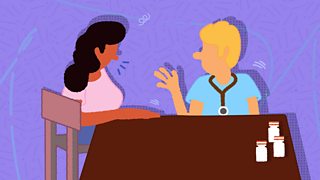Important things you should know about PTSD

On this week, Katie Thistleton and Dr Radha will be discussing trauma - emotional, physical - Post Traumatic Stress Disorder (PTSD) and the long term effects these can have on you.
Traumatic events in our past can come back to do more than haunt us, they can seriously disrupt our lives and make everyday life nearly impossible.
Our experts will be sharing their advice and speaking to some of you about your experiences with PTSD on this week's trauma special, but before you listen, here's what you need to know about PTSD.
So, what is Post Traumatic Stress Disorder?
The as "an anxiety disorder caused by very stressful, frightening or distressing events,"
A lot of soldiers experience it after their experiences at war but it can happen to anyone after a traumatic event - and it can surface years after the incident that caused it.
People suffering from PTSD often repeatedly relive the incident that caused the trauma through nightmares and flashbacks and struggle with feelings of isolation, guilt and irritability. Sufferers can also find it difficult to sleep or concentrate.
All of which makes day to day life very difficult indeed.
Anyone who thinks they might be suffering from PTSD is recommended to see a GP.
Did you know Lady Gaga suffers from it?

The most high profile A-lister to have spoken out about their struggle with PTSD is Lady Gaga. She says she was raped when she was 19 and the repercussions of the attack remain with her to this day.
The kindness shown to me by doctors as well as my family and my friends really saved my lifeLady Gaga
She spoke about her struggle for the first time in 2016 in an interview on US television.
"I suffer from PTSD. I’ve never told anyone that before, so here we are," she said on NBC's The Today Show.
"But the kindness that’s shown to me by doctors as well as my family, and my friends, it’s really saved my life."
She had shared details of her rape as a teenager two years before, telling American radio host Howard Stern about the incident in 2014.
"I was about 19," Gage said on his radio show.
"I went to Catholic school and then all this crazy stuff happened, and I was going, ‘Oh, is this just the way adults are?’.
"I was very naive."
She says she battles with mental illness every day, but has used therapy and meditation to help her overcome her issues.
Will Young experienced a very public struggle with PTSD

Will Young shocked viewers of Strictly Come Dancing in 2015 when he pulled out of the show, admitting that his PTSD had made it impossible for him to take part in the show.
Your body can’t cope with the flooding of emotions from the pastWill Young
"I got PTSD and depersonalisation and derealisation,” he told The Telegraph, shortly after quitting the talent show.
"Your body can’t cope with the flooding of emotions from the past.”
Will described how the impact of earlier events made the pressure of competing impossible - and how his PTSD made his day to day commitments nearly impossible.
"I was really ill. I was dragging myself to rehearsals," he said.
"I just couldn't do it anymore. It was so bad I thought - I'm not joking - I thought about breaking my leg."
Will says his PTSD was caused by keeping his sexuality a secret, his experiences at the hands of primary school bullies and being separated from his twin brother at birth.
Dr Radha's advice if you think you're suffering PTSD
"Trauma from past experiences can affect us all and leave us feeling anxious, sad, angry or confused," says Dr Radha. "Everyone reacts differently to traumatic events so there is no 'right' or 'wrong'.
Our brains usually process experiences that we have but if events are traumatic this can be difficult. Feelings and thoughts are part of this processing, but they can be overwhelming sometimes.
Sometimes PTSD can develop where you experience flashbacks, anxiety and you might try to avoid certain situations or feelings.
There is lots of professional support and help out there to enable you to process and work through trauma and help you move forward from it."
Here are some tips for dealing with trauma, courtesy of Dr Radha:
- talking to someone you trust helps you feel less alone and helps you to start expressing your feelings
- getting professional help and support by letting your GP know how you are feeling
- looking after yourself physically by getting good sleep, exercise and eating well
- try and understand what your triggers are for your feelings or flashbacks if you have them; try some grounding techniques and breathing exercises to bring you back into the present moment and remind yourself you are safe
- be patient and kind to yourself
Listen to The Surgery on Radio 1 at 9pm on Wednesday


















































